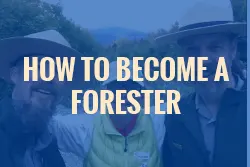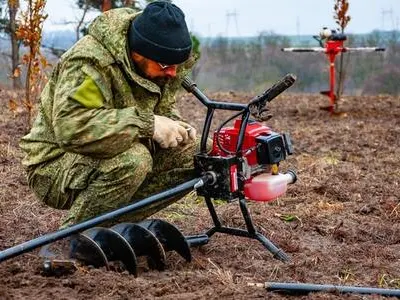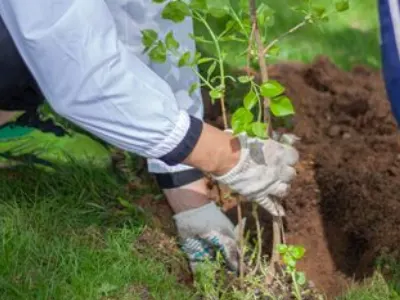Last Updated: July 2nd, 2022 by

Career Shortcuts
Do you have a passion for the natural environment? Are you looking for a career that will allow you to help conserve our forests and their resources?
If so, learning how to become a forester may be the perfect choice for you! This is a highly demanding field, but it can also be a gratifying career.
This blog post will discuss how to become a forester or forest technician. So, if you are ready to make a difference in the environment, keep reading!
Visit our Career Guide for a list of all our job insights for an in depth look at the new career path you are considering.
What is Forestry?

Forestry is the management and care of forests, including tree planting, felling, harvesting, etc.
It’s an important job because forests provide everything we need, like wood for building and paper, oxygen for breathing, and homes for wildlife.
Forests also help prevent soil erosion and can act as a natural sponge to soak up water during heavy rains, which helps prevent floods.
Forests are found all over the world and are vital to our planet. However, they’re under threat from deforestation (when trees are cut down faster than they can grow) and climate change.
This is why it’s so important that we manage forests carefully, and there are different types of forest management depending on what the forest is being used for.
For example, some forests are managed for conservation purposes, which means they’re kept natural and undisturbed as much as possible.
Others are managed for timber production, which means more trees are planted and grown for harvest.
No matter the forest’s purpose, it must be driven responsibly to protect these essential ecosystems.
Read More: How to Become a Marine Biologist. If you’re interested in learning about and helping ecosystems, check out our guide to Marine Biology!
What Do Foresters Do?
Foresters are responsible for the management and conservation of forests.
They develop plans to ensure that forests are healthy and productive, and they implement measures to protect forests from fire, pests, and disease.
In addition, foresters work to promote the sustainable use of forest resources, such as timber and wildlife.
Foresters also engage in research to improve our understanding of forest ecosystems.
Some foresters specialize in a particular forestry area, such as wildlife management or silviculture (the cultivation of trees).
Others may work in resource management, developing plans for the efficient use of forest resources.
Regardless of their specialization, all foresters share a commitment to the stewardship of our natural resources.
Check out this video for an engaging look into the world of Forestry:

Career Guide
How to Become a Forester
Becoming a forester requires a passion for the natural environment and a commitment to one’s education.
This means becoming a professional forester requires some essential steps, which include:
Get a Degree
Becoming a forester is a great way to protect and conserve our natural resources. A degree in forestry will give you the knowledge and skills you need to manage forests and other natural resources.
In an undergraduate and/or graduate program, you’ll learn about tree biology, ecology, silviculture, dendrology, and forest management.
You’ll also gain experience in forest inventory, GIS, remote sensing, and natural resource policy.
A degree in forestry will prepare you for a career in environmental conservation, land management, or even teaching.
So, if you’re looking for a way to help preserve our planet’s natural resources, consider learning how to become a forester by earning a degree in forestry or a related field.
Gain Experience
Becoming a forester is a great way to gain experience in forestry.
Foresters typically work for state or federal agencies, and their duties include managing forests and timberlands, developing forest management plans, and inspecting timber operations.
In addition to gaining valuable experience in forest management, being a forester also offers opportunities to learn about other aspects of forestry, such as tree physiology and silviculture.
Becoming a forester is a great way to start your career in forestry.
Apply for a Forestry License
To become licensed, applicants must first complete an accredited forestry program.
These programs typically take four years to complete and include coursework in subjects such as forest Ecology, Silviculture, and Natural Resource Conservation.
After completing a forestry program, applicants must then pass a state-specific exam.
The exam covers tree identification, timber harvesting methods, and forest management principles.
Upon passing the exam, applicants will be issued a license to practice forestry in their state of residence.
Earn a Certification
Becoming a certified forester is a great way to make a difference in your community.
Not only will you be able to help protect and preserve our natural resources, but you’ll also gain the satisfaction of knowing that you’re making a positive impact on the environment.
Becoming a certified forester is not tricky, but it does require some time and effort. First, you’ll need to complete an accredited forestry program.
Once you’ve finished your studies, you’ll need to take and pass the Certified Forester Exam. After that, you’ll be ready to begin your career as a certified forester.
With your new certification, you’ll be able to work in a variety of settings, from state and national parks to private forests.
No matter where you end up working, you can be sure that you’re making a difference.
Forester Skills
Foresters are responsible for the stewardship and management of forested ecosystems.
They plan, direct, coordinate, and implement programs designed to protect and conserve forests.
Foresters’ skills include:
- Understanding tree physiology and the effects of environmental stressors, such as disease, fire, insects, and drought.
- Knowing how to identify native and non-native trees and plants.
- Conducting tree inventories.
- GIS mapping and GPS navigation.
- Creating management plans.
- Supervising forest workers.
Foresters work in many settings, including private industry, state and federal agencies, non-profit organizations, and consulting firms.
They may also choose to become certified in specialty areas, such as tree farm management, urban forestry, or wildfire management.
With the increasing importance of forests in the global climate change equation, the demand for forestry skills is expected to grow in the coming years.
Read More: How to Become a Wildlife Photographer. If you love nature, but want to admire it from a distance, a career in photography may be for you. Here’s what to know.
Forester Salary and Job Outlook

Foresters are responsible for the health and maintenance of forests, and they play a vital role in environmental conservation.
The average salary for a forester is $60,000 per year, and a foresters’ job growth is projected to be 7% from 2018 to 2028, faster than the average for all occupations.
Foresters must have a bachelor’s degree in forestry or a related field.
Many foresters also hold master’s degrees or doctorates. Foresters typically work for state or federal agencies, or they may be self-employed.
Foresters often work outdoors and may spend a considerable amount of time hiking through forests.
Foresters must effectively communicate with the public, as they often give presentations and lead tours.
They must also work well with other professionals, such as loggers, to ensure that forests are managed sustainably.
Read More: How to Become a Zoo Veterinarian. Zoo Vets interact with exotic animals daily. If you have a passion for wild animals, this may be a career path to consider!
Conclusion
Becoming a forester is a great way to make a difference in your community.
With your new certification, you’ll be able to work in a variety of settings, from state and national parks to private forests.
No matter where you end up working, you can be sure that you’re positively impacting the environment.
If you’re interested in becoming a forester, be sure to complete an accredited forestry program and take the Certified Forester Exam.
With the proper education and training, you can begin your career as a certified forester and make a difference in the world.
Other Interesting Articles

